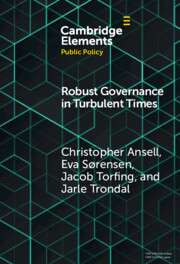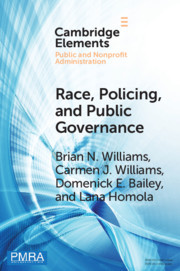Refine search
Actions for selected content:
4 results

Value-Based Governance
-
- Published online:
- 17 December 2025
- Print publication:
- 22 January 2026
-
- Element
-
- You have access
- Open access
- HTML
- Export citation

Robust Governance in Turbulent Times
-
- Published online:
- 26 April 2024
- Print publication:
- 16 May 2024
-
- Element
-
- You have access
- Open access
- HTML
- Export citation
18 - Legal Scholastic and Humanist Influences on Grotius
- from Part IV - Grotius as a Legal Scholar
-
-
- Book:
- The Cambridge Companion to Hugo Grotius
- Published online:
- 03 September 2021
- Print publication:
- 16 September 2021, pp 387-408
-
- Chapter
- Export citation

Race, Policing, and Public Governance
- On the Other Side of Now
-
- Published online:
- 04 June 2021
- Print publication:
- 01 July 2021
-
- Element
- Export citation
